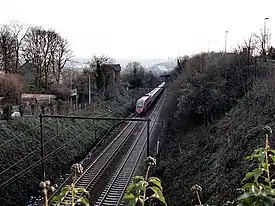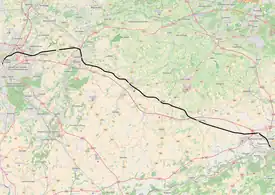Belgian railway line 36
The Belgian railway line 36 is a railway line in Belgium connecting Brussels to Liège. Completed in 1866, the line runs 99.3 km.[1] Trains running between Brussels and Aachen in Germany use the line as far as Liège, and then line 37 between Liège and the German border, the last stop in Belgium being Welkenraedt.[2]
Between Schaarbeek and Leuven, the line is 4-track; the outer tracks serve local trains with many stops, while the central tracks carry intercity and high-speed trains; these are called L36N, and branch off after Leuven onto a separate route that mostly follows the E40 motorway towards Liege. The Diabolo project connects L36 to the station under Brussels Airport.
The following stations are located on the line:
- Brussels-North
- Schaerbeek
- Haren-South
- Diegem
- Zaventem
- Brussels-National-Airport
- Kortenberg
- Erps-Kwerps
- Veltem
- Herent
- Leuven
- Vertrijk
- Tienen
- Ezemaal
- Neerwinden
- Landen
- Waremme
- Bleret
- Remicourt
- Momalle
- Fexhe-le-Haut-Clocher
- Voroux-Goreux
- Bierset-Awans
- Ans
- Liège-Guillemins
Inclined Planes of Liège
Between Ans and Liège the railway line has to descend 358 feet within less than 5 miles. This steep incline was initially negotiated with the help of a fixed engine driving an endless rope that was used to haul the trains without the help of a locomotive.[3] After the late 1860s, special banking locomotives were used and the fixed engine was discarded. Another line (line 36A) was built to bypass the incline but this line is only used by freight trains.[4]
When line 36 was electrified in 1955, most of the trains still needed a banking engine. Currently, some trains are powerful enough to climb the incline without a helper and the rest are provided with two locomotives. The rear engine is no longer removed at Ans in order to save time.
References
- "Ligne 36: Bruxelles-Nord - Liège-Guillemins". BelRail.be.
- "Ligne 37: Liège-Guillemins - Hergenrath - (D)". BelRail.be.
- The Edinburgh New Philosophical Journal: Exhibiting a View of the Progressive Discoveries and Improvements in the Sciences and the Arts. A. and C. Black. 1845.
- "Les plans inclinés de Liège - Rixke Rail's Archives". rixke.tassignon.be (in French). Retrieved 2018-11-08.

